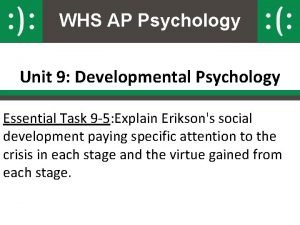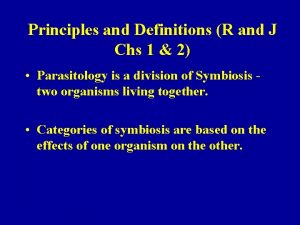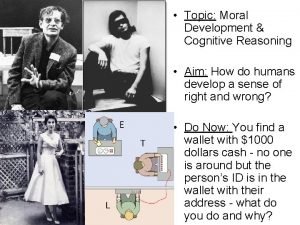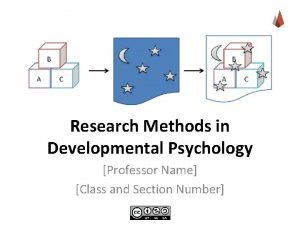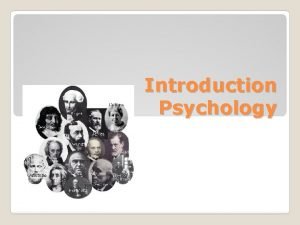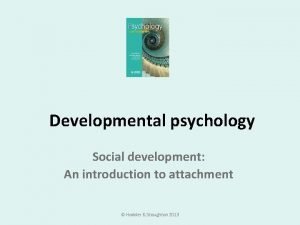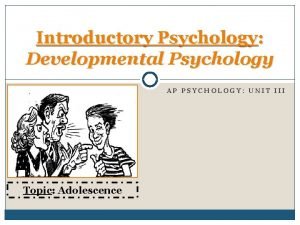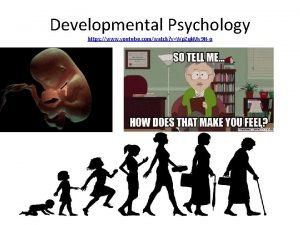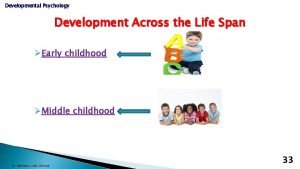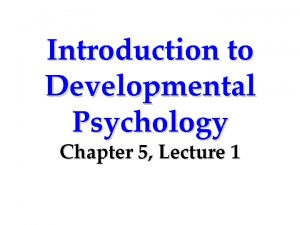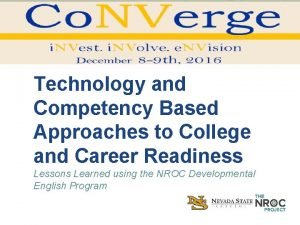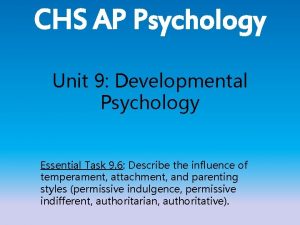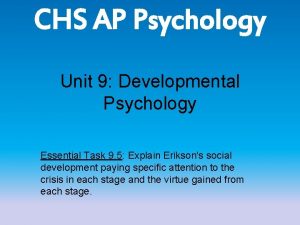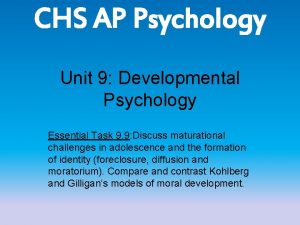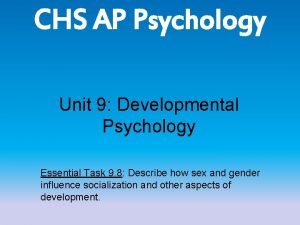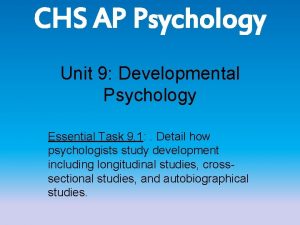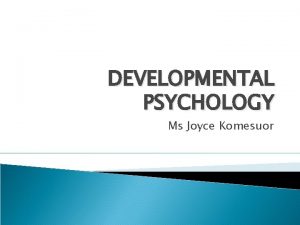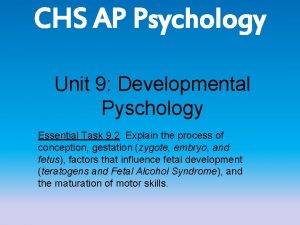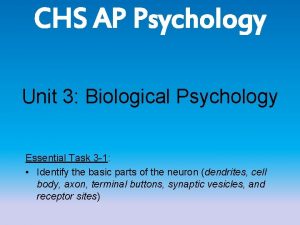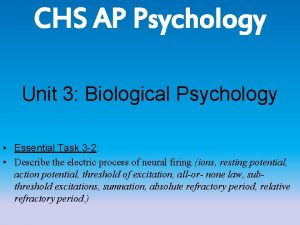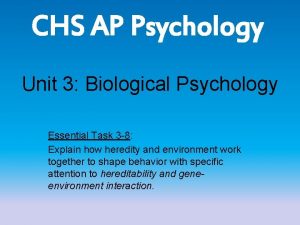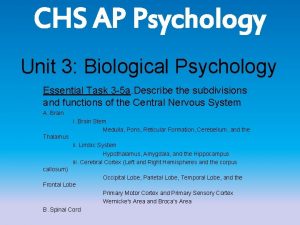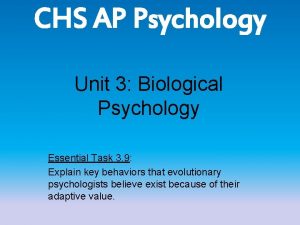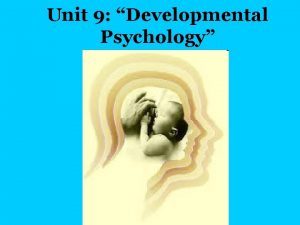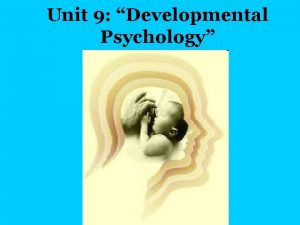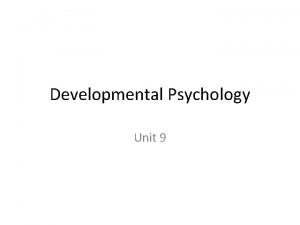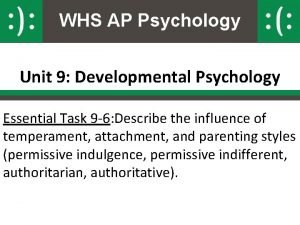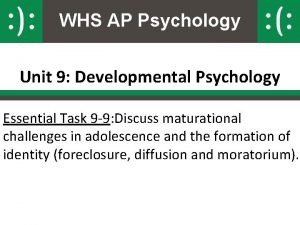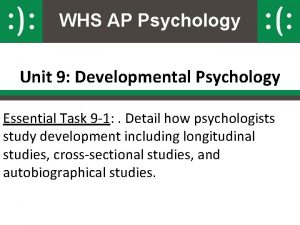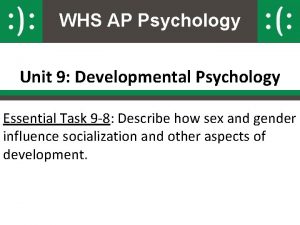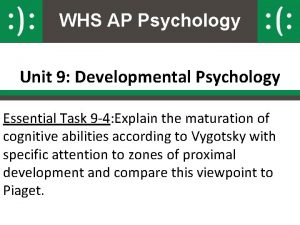CHS AP Psychology Unit 9 Developmental Psychology Essential





























- Slides: 29

CHS AP Psychology Unit 9: Developmental Psychology Essential Task 9. 3: Explain the maturation of cognitive abilities according to Piaget with specific attention to object permanence in the sensorimotor stage, magical thinking, theory of mind, and the lack of conservation and reversible thinking in the preoperational stage, overcoming the limitations of the preoperational stage in the concrete operational stage, and the development of abstract reasoning in the formal operational stage.

Developmental Psychology • Study of humans from womb to tomb.

Conception, Development, and Birth… • I have a Power. Point on my teacher page, so look at it! • We don’t have time in class…

Cognitive Development in the Newborn Investigators study infants becoming habituated to objects over a period of time. Infants pay more attention to new objects than habituated ones, which shows they are learning

Physical Development • Children grow about 10 inches and gain about 15 pounds in first year • Growth occurs in spurts, as much as 1 inch overnight • Growth slows during second year

Motor Development • Developmental Norms – Ages by which an average child achieves various developmental milestones – First, infants begin to roll over. Next, they sit unsupported, crawl, and finally walk. – Experience has little effect on this sequence.

Jean Piaget 1896 -1980 Piaget believed that the driving force behind cognitive development is our biological development (maturation)

Cognitive Development • As we get older we enter into new cognitive stages.

Schemas are mental molds that we use to organize our world and are formed from experiences. https: //www. youtube. com/watch? v=EB M 854 BTGL 0

Assimilation and Accommodation Bill Anderson/ Photo Researchers, Inc. The process of assimilation involves incorporating new experiences into our current understanding (schema). The process of adjusting a schema and modifying it is called accommodation. Jean Piaget with a subject

• Mental Reps • Complex Classification

Sensorimotor Stage 0 -2 • In the sensorimotor stage, babies take in the world by looking, hearing, touching, mouthing, and grasping. • They are learning to sense • They are learning to move

Object Permanence • THE major cognitive ability gained at this stage. • Definition - objects that are out of sight still exist. Drop the mic and walk away… • Children younger than 6 months of age do not grasp object permanence

Stranger anxiety The fear of strangers that develops at around 8 months. This is the age at which infants form schemas for familiar faces and cannot assimilate a new face. © Christina Kennedy/ Photo. Edit

Separation Anxiety Separation anxiety peaks at 13 months of age, regardless of whether the children are home or sent to day care.

Sensorimotor Stage: Criticisms Piaget believed children in the sensorimotor stage could not think —they do not have any abstract concepts or ideas. However, recent research shows that children in the sensorimotor stage can think and count. 1. Children understand the basic laws of physics. They are amazed at how a ball can stop in midair or disappear.

Sensorimotor Stage: Criticisms 2. Children can also count. Wynn (1992, 2000) showed that children stared longer at the wrong number of objects than the right ones. They know something isn’t quite right.

Preoperational Stage Piaget suggested that from 2 years old to about 6 -7 years old, children are in the preoperational stage—too young to perform mental operations.

Preoperational Stage • Able to represent things with words and images • They can “pretend play” • Very “egocentric”

Development of a Theory of Mind Preschoolers, although still egocentric, develop the ability to understand another’s mental state when they begin forming a theory of mind (understanding other’s intentions). The problem on the right probes such ability in children.

Development of Mental Representations- Criticism §De. Loache (1987) showed that children as young as 3 years of age are able to use metal operations. §When shown a model of a dog’s hiding place behind the couch, a 2½-year-old could not locate the stuffed dog in an actual room, but the 3 -year-old did. Piaget believed this did not happen until later years.

Concrete Operational Stage In concrete operational stage, given concrete materials, 6 - to 7 -year-olds grasp conservation problems and mentally pour liquids back and forth into glasses of different shapes conserving their quantities. Children in this stage are also able to transform mathematical functions. So, if 4 + 8 = 12, then a transformation, 12 – 4 = 8, is also easily doable.

Formal Operational Stage Around age 12, our reasoning ability expands from concrete thinking to abstract thinking. We can now use symbols and imagined realities to systematically reason. Piaget called this formal operational thinking. If John is in school, Mary is in school. John is in school. What can you say about Mary?

Reflecting on Piaget’s Theory Piaget’s stage theory has been influential globally, validating a number of ideas regarding growth and development in many cultures and societies. However, today’s researchers believe the following: 1. Development is a continuous process. 2. Children express their mental abilities and operations at an earlier age. 3. Formal logic is a smaller part of cognition.


Lev Vygotsky • Different than Piaget’s image of the individual constructing understanding alone – Everything is social

Vygotsky • Vygotsky saw cognitive development as depending more on interactions with people & tools in the child’s world. – Tools are real: pens, paper, computers; – or Tools are symbols: language, math systems, signs

The Big Ideas… • Explained complex learning through Guided Participation. – Things are taught rather than discovered (reading, writing etc. ) – a way to “share thinking load” – Helping a novice accomplish a complex task • Assistance can be physical or mental & come from adults or peers – Scaffolding: where the more knowledgeable other provides some type of structure.

The Big Ideas… • Vygotsky developed theory of the Zone of proximal development (ZPD) – The distance between where a learner is at developmentally on their own & where a learner could be with the help of a more knowledgeable other. – A more knowledgeable other can be an adult or a peer, helping a learner in this way is to scaffold their learning. • Emphasized social learning – We can often complete harder tasks with someone else than we could alone.
 Unit 9 developmental psychology
Unit 9 developmental psychology Authoritariam
Authoritariam Chs lancers
Chs lancers Chs scaffolding
Chs scaffolding Ibs or chs
Ibs or chs Chs statistics
Chs statistics St roberts high school
St roberts high school Concept of disease
Concept of disease Chs module
Chs module J'chs 1
J'chs 1 Chs investigations
Chs investigations Cms.edf.school
Cms.edf.school Chs hcpss
Chs hcpss Cylinder dysku twardego
Cylinder dysku twardego Chs investigations
Chs investigations Characteristics of lipids
Characteristics of lipids Lawrence kohlberg developmental psychology
Lawrence kohlberg developmental psychology Research methods in developmental psychology
Research methods in developmental psychology Gestalt
Gestalt Attachment developmental psychology
Attachment developmental psychology Developmental psychology
Developmental psychology Devonte is a graduate student in developmental psychology
Devonte is a graduate student in developmental psychology Ucf psychology department
Ucf psychology department Developmental psychology youtube
Developmental psychology youtube Animism examples psychology
Animism examples psychology Chapter 5 developmental psychology
Chapter 5 developmental psychology Nroc developmental english unit 6
Nroc developmental english unit 6 Unit 6 review questions
Unit 6 review questions Essential questions poetry
Essential questions poetry Developmental stages theory
Developmental stages theory
